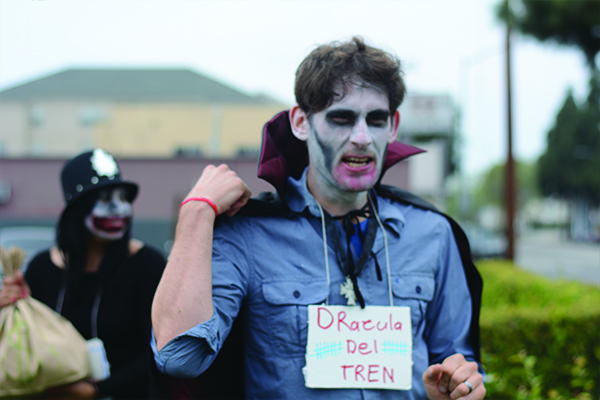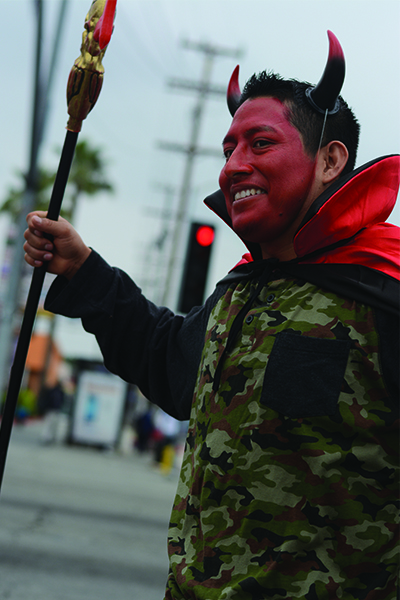Fare Raise Has Bus Riders Worried

The performance portrayed three villains, Rail Dracula, the Highway Devil and the Fair Snatcher, who faced off against the hero Super Pasajera (passenger) in the quest for accessible transportation.
The performance was organized by the Bus Riders Union, a coalition fighting for Los Angeles’ transit dependent community against policy changes that would make it more difficult for the city’s poorest to successfully move about the city.
The Bus Riders Union believes that since the lion’s share of people who utilize Los Angeles’ transit system rely on buses, Metro should focus on creating a first-class bus system before expanding the rail system.
According to Metro’s own statistics, about 1.2 million people boarded MTA buses daily during February of 2014, compared to the approximately 350,000 people who used Metro Rail in the same month.
READ MORE: Metro Fare Change Could Help Some, Hurt Others
“Metro trying to make a multi-modal transit system. Cars and trains are being pitted against buses,” said Barbara Lott-Holland, the co chair of the Bus Riders Union. “They are expanding for choice riders, while neglecting those who really depend public transit to get around.”
Lott-Holland’s mention of "choice riders" refers to those who don’t need public transportation to get around. The average household income of bus riders in Los Angeles is about $16,000 per year—less than a third of the average household income in the city.

If the fare increases by 1 dollar, that hurts a family that makes $14,000 each year more than one that makes $40,000.
“Families have to decide of who does or doesn’t ride the bus in a week, or who gets their medicine, or which bills can be paid,” said Eric Romann, who portrayed Rail Dracula. “These are the decisions that the poor make on a daily basis.”
Roman’s character in the skit, Rail Dracula, represents the Bus Rider’s Union’s philosophy that Metro’s rail development is sucking funds away from bus operation around the city.
Metro officials say that the agency is facing an operating budget deficit that can only be remedied by increasing fares. According to a January report, Metro will face a $36 million dollar deficit in its operating budget by 2016, with the possibility for that number to grow to $225 million a decade from now.
Staffers have proposed two options—both of which increase fares in steps over the next seven years.
The first option increases the basic fare to $1.75 this September, and then again to $2 in 2017. By 2021, the basic fare for boarding would be $2.25. A day pass would also increase from it’s present $5 cost to $9.
The second would leave fares at $1.50 during non rush-hour times. During rush-hour, however, fares would increase to $2.25 in September, and then to $3.25 in 2021—more than double its current cost. A $5 day pass would nearly triple to $13 in 2021.
Of critical importance to the Bus Riders Union is the price of a monthly pass, which presently costs $75. Under the two options, the cost would rise to $135 or $180 respectively.
READ MORE: Despite Its Current Benefits, The L.A. Metro Needs Improvement
However, the Bus Riders Union believes that Metro’s operating budget is only facing a shortfall because so much of the agency’s money is being devoted to both rail and freeway construction. Metro is currently working on five major concurrent construction projects—including the Expo Line extension to Santa Monica and the 405-widening project.
To Lott-Holland and other members of the Bus Rider’s Union, Metro is squeezing those who need mobility unfairly.
“Metro has money to operate,” Lott-Holland said “But they keep diverting the funds to building new projects. This means that the money doesn’t show up on Metro’s operational budget, but instead it’s development one.”

For the Bus Riders Union, it’s unacceptable to prioritize some types of transit development, while simultaneously cutting service on others. Lott-Holland spoke of how around Los Angeles, several bus routes have been cut in the past few years, as Metro shifts its concentration to rail development.
Since 2009, several of Metro’s rapid bus lines (buses that operate at a quicker, more frequent pace than its local service buses), have been cut—including several in the poorest parts of Los Angeles County.
Although these lines were cut for monetary reasons, they are indicators of Metro’s attitude towards bus transit: restriction not expansion.
“We’re not saying don’t build trains, we’re just saying that if you’re going to build trains, you’d better have a first-class bus system first,” said Lott-Holland. “After you’ve got a first class bus system that can serve the needs of everyone, then you can start looking to build trains.”
Metro will be holding a public hearing on the fare proposal Saturday, March 29th at 9:30am at the agency’s headquarters, adjacent Union Station.
Contact Staff Reporter Matthew Tinoco here.



